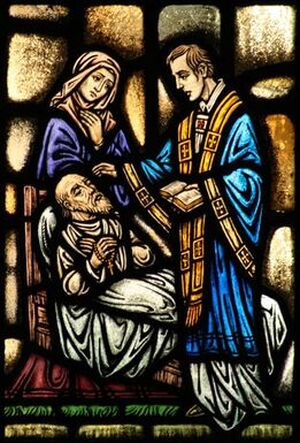ANOINTING OF THE SICK

The Catechism of the Catholic Church describes the sacrament in this way: “The Church believes and confesses that among the seven sacraments there is one especially intended to strengthen those who are being tried by illness...”(CCC1511).
We find the instruction to anoint the sick in the Book of James in the New Testament:
“Is any among you sick? Let him call for the elders of the church, and let them pray over him, anointing him with oil in the name of the Lord; and the prayer of faith will save the sick man, and the Lord will raise him up; and if he has committed sins, he will be forgiven.” (James 5:14).
The anointing gives both spiritual and, if it be in accord with God’s will, physical healing. The recipient’s sins are forgiven and they are strengthened by prayers. The rite of anointing may be a simple ceremony with the individual at home, in a hospital or healthcare facility, or may be incorporated into a Mass or in a group setting. The rite includes anointing on the forehead and palms of the hand with blessed oil. The anointing is commonly celebrated in the context of the reception of Holy Communion and, if appropriate, of the Sacrament of Reconciliation.
We find the instruction to anoint the sick in the Book of James in the New Testament:
“Is any among you sick? Let him call for the elders of the church, and let them pray over him, anointing him with oil in the name of the Lord; and the prayer of faith will save the sick man, and the Lord will raise him up; and if he has committed sins, he will be forgiven.” (James 5:14).
The anointing gives both spiritual and, if it be in accord with God’s will, physical healing. The recipient’s sins are forgiven and they are strengthened by prayers. The rite of anointing may be a simple ceremony with the individual at home, in a hospital or healthcare facility, or may be incorporated into a Mass or in a group setting. The rite includes anointing on the forehead and palms of the hand with blessed oil. The anointing is commonly celebrated in the context of the reception of Holy Communion and, if appropriate, of the Sacrament of Reconciliation.
